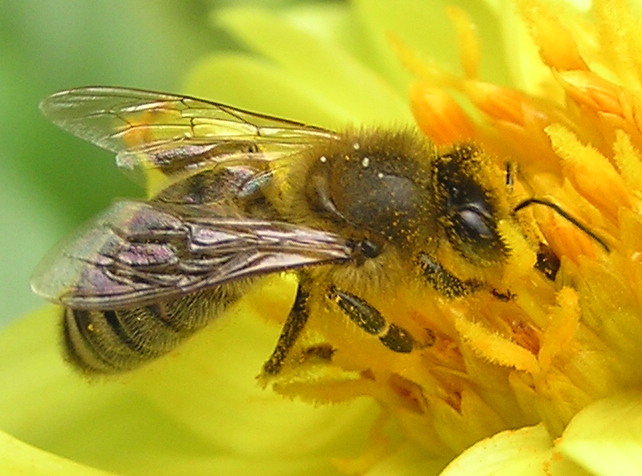 Over the last 6 days, I've continued to use my bathroom despite the bee's presence. I've been careful not to make loud noises or sudden movements. Even the noise generated by the flushing of the cistern did not faze those bees.
Over the last 6 days, I've continued to use my bathroom despite the bee's presence. I've been careful not to make loud noises or sudden movements. Even the noise generated by the flushing of the cistern did not faze those bees.I was particularly careful not to accidentally step or crush any of them as the dead bee would release a chemical that would trigger the rest of the bees to attack blindly.
Those bees have been pretty tolerant of me even though I carry out my toilet activities just 3 to 4 meters from their hive. I guess they realise that they are the guests. There was only an instance when a guard bee flew in front of me to warn me away as I was showering. I backed away and that bee figured out that I was not a threat to them. The overwhelming majority of the time, the bees pretty much left me alone when I brush my teeth and 'do my business' immediately below their hive.
Here are some observations that I've noticed:
1. Timing
 The hive begins to get active from about 8.30am when the bees will actively fly in and out as they collect nectar. Throughout the day, the bees will continue to be busy with their repeated trips. Once it gets dark, the bees will all huddle together in the nest and there'd be no further bees in flight. At night, the the hive appears to be about 20% larger than in the day as many of the bees that forage of honey return.
The hive begins to get active from about 8.30am when the bees will actively fly in and out as they collect nectar. Throughout the day, the bees will continue to be busy with their repeated trips. Once it gets dark, the bees will all huddle together in the nest and there'd be no further bees in flight. At night, the the hive appears to be about 20% larger than in the day as many of the bees that forage of honey return.On a few occasions, during the interval after sunset but before the sky turns completely dark, the bees did show amusing behaviour. When I switched on the tungsten bulb in my bathroom, 4 to 5 bees would fly from the hive towards the light source and they kept bumping into the bulb. Perhaps they thought that the bulb was the sun. Yet, once the sky turns dark outside, even when that same bulb is switched on, those bees would not react that way.
2. Weather
When it rained during the day, all of the bees would remain clustered together in their hive and none of them fly inside the bathroom.
3. Hive activity
I set up my birding telescope to observe the nest and it appears that the hive can be separated into 2 parts.
Refer to the picture below and imagine it to be divided into thirds.
In general, the bees cling on to each others back and are almost always oriented with their heads pointing upwards.
a. Top third of hive :
The bees in this zone have it tough, especially those at the perimeter of the hive and the ceiling board.
Their role is to latch on to the ceiling board with their claws and mandibles to provide stability for the nest. Other bees will then latch on to them so they basically have to bear the weight of other bees below them too.
I made it a point to follow a few of those bees, and they kept that extended position for up to 5 hours per session. Usually, those bees would release their holds only when there are enough bees around them so that they can safely let go without causing any structural weakness. When they are finally relieved of their duty, they'd be absolutely exhausted and cannot even crawl properly.
Meanwhile, some larger bees would, on occasion, come by and use its antenna to tap at the former's back.
One interesting feature of the bees here is that new some bees that attempt to cling on to the ceiling would first try to use their claws and mandibles to gain a grip to secure themselves to the ceiling board. Since the ceiling is painted over, the surface is smooth so it is difficult to get a grip. Should the bee fail to find a secure foothold, it would then extend its proboscis (long tube-like tongue) and lick at the ceiling. Soon after, the same bee was able to gain a secure foothold. I suspect that they were spreading their honey onto the smooth surface so that once the honey has dried out, the surface would become rough enough to be usable.
Besides securing themselves to the ceiling, some of those bees were seen slowly tearing the paint away with their mandibles.
b. Bottom 2/3 of hive :
This is where some returning bees would land and burrow into the mass of bees. Oftentimes, there would be some bees that would emerge from the crowd to the surface and they tend to appear extremely tired.


No comments:
Post a Comment